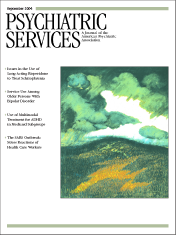Hargrave v. Vermont and the Quality of Care
In Reply: Michael Allen's letter is misleading in several respects. Although he appears to offer an independent comment on the decision in Hargrave, in actuality the Bazelon Center was deeply involved in the case. Not only did the Bazelon Center participate as amicus curiae, but (as noted in its annual report) it also actively recruited former state mental health commissioners to write a second amicus brief, both facts oddly omitted from Allen's letter. Thus the letter represents a continuation of the Bazelon Center's advocacy in the case—here trying to spin the outcome into something more palatable to mental health professionals.
To be clear about the nature of the court's decision, Hargrave allows persons with mental illness who complete advance directives to preclude any future involuntary treatment with medications, even if they are involuntarily committed. Previous court decisions and statutes recognizing a right to refuse treatment have proven workable only because they uniformly allow refusals to be overridden, either after additional review for appropriateness or when patients are found incompetent. Hargrave changes all that, at least in the Second Circuit. Only Jonathan Swift could call this a "modest conclusion."
Although the opinion is quite sweeping in its implications, its actual impact remains to be determined. Hence, Mr. Allen's assertion that I characterized the decision as "potentially cataclysmic" and evidence that "the sky is falling" suggests to me that he was reading some other column than the one I wrote. As I noted, it is unclear whether any other court will adopt Hargrave's approach, and in any event, the major impact is likely to be a diminution of enthusiasm among clinicians for advance directives, which may sharply restrict their use by patients, a most unfortunate result.
Finally, a word about what Allen calls "the profession of psychiatry['s]…uneasiness about consumer input." Psychiatrists and other mental health professionals struggle daily to build alliances with the people whose illnesses they are attempting to treat. To suggest that they have to be taught the importance of "trust-building" and working collaboratively with their patients is not only absurd but insulting. What neither the decision in Hargrave nor the Bazelon Center have an answer to, however, is what happens when—as a result of severe mental disorder—trust cannot be built and an alliance cannot be established. To pretend that such situations do not exist hardly advances a "new vision for public mental health."



